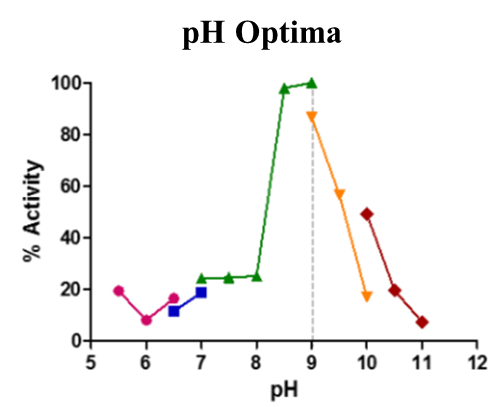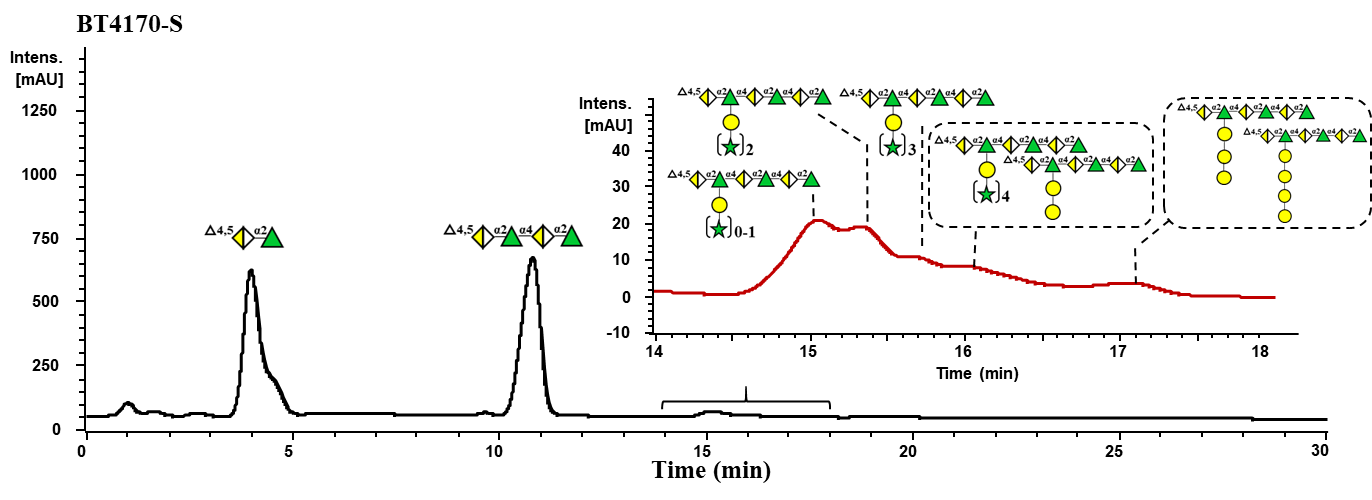BtRgl9A(Rhamnogalacturonan lyase)
BtRgl9A
En-Rgl0174
(EC. 4.2.2.23) Rhamnogalacturonan lyase
CAZy Family: PL9
PROPERTIES
1. ELECTROPHORETIC PURITY
-Single band on SDS-gel electrophoresis (MW ~57 kDa)

Figure 1. Electrophoresis analysis of BtRgl9A. M, molecular weight marker (PageRuler Prestained Protein Ladder, Thermo Scientific); lane 1, culture lysate before IPTG induction; lane 2, culture lysate after IPTG induction; lane 3, BtRgl9A purified from Ni sepharose fast flow column.
2. SPECIFIC ACTIVITY
2.3 U/mg protein (on RG-I-AT from Adenophora tetraphylla(Thunb.)Fisch.) at pH8.0 and 37°C
One unit of RGL activity was defined as the amount of enzyme required to generate 1 μmol of 4,5-unsaturated galacturonic acid in 1 min.
3. RELATIVE RATES OF HYDROLYSIS OF SUBSTRATES
Table 1 Activity of BtRgl9A
Substrate |
kcat(min-1) |
Km (mM) |
kcat/Km (mM-1 min-1) |
AM-RG-I |
1.7 x 103 ± 62.2 |
0.030 ± 0.004 |
5.5 x 104± 8.7 x 103 |
Sugar beet arabinan |
1.2 x 103 ± 32.4 |
0.257 ± 0.022 |
5.2 x 103 ± 598 |
P-RG-I |
-- |
||
4. PHYSICOCHEMICAL PROPERTIES
pH Optima: 9.0
Temperature Optima: 37°C

Figure 2. Effect of pH on the activity of recombinant BtRgl9A. Assays were carried out at 37 °C for 10 min in buffers ranging in pH from 5.5 to 11.0. The activity at optimum pH was defifined as 100%.

Figure 3. HILIC-UV (UV235 nm) chromatograms of BtRgl9A oligosaccharides.
5. STORAGE CONDITIONS
The enzyme should be stored at -20°C. For assay, this enzyme should be diluted in phosphate buffer (50 mM) pH 8.0. Swirl to mix the enzyme immediately prior to use.
6. REFERENCE
[1] Luís A S. Microbial pectin recognition and utilization of the mammalian gastrointestinal tract[D]. Newcastle University, 2017.


